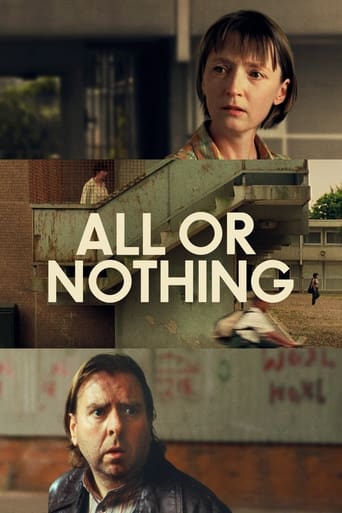MartinHafer
"All or Nothing" is a very, very tough film to watch. Many of the characters are unlikable and the rest just seem very sad...and rather pathetic. It's still worth seeing, however...despite its many, many problems.The story is about a lower working class family in London and, to a lesser extent, the families around them. Director Mike Leigh did a good job recreating this oppressive and anger-filled environment...and the acting is top-notch because it's so realistic. But seeing the folks being cruel to each other again and again wears on the viewer. In fact, I think editing out a bit of this would have made for a better film.So why did I still like it despite all this? First, when a crisis comes to the family, it also creates the possibility of change and growth...not pie in the sky and unrealistic changes but ones that are indeed possible. Second, during this crisis towards the end of the film, the acting is at its finest. Not a perfect film...but worth it for the finale.
Red_Identity
It's kinda shocking to see the reviews and the reception this got. Good reviews and reception, yes, but in comparison to Mike Leigh's other 2000s work, it's sort of surprising. Not sure why though, although I guess there's less of a clear narrative to go from here, certainly unlike something like Vera Drake. The performances from mike Leigh's regular, recurring cast are great. It's nice to see timothy Spall and Lesley Manville doing some strong work together. The film is well-done in every respect as well, never really calling attention to itself in any way and allowing the events of the plot, of these characters' lives, to transpire organically and naturally. This is definitely recommended to his fans
Graham Greene
Mike Leigh can always be counted on when it comes to presenting truthful, emotional and compelling British cinema. Over the past twenty years, he has progressed beyond the limitations of cosy teatime telly to present us with something that resonates with a sense of reality far more potent than that of our previous king of kitchen-sink despair, Ken Loach. When at his best, Leigh is a creator of honest and heartfelt, slice-of-life pictures that move effortlessly from scenes of warm humour, to moments of crippling despair; whilst always offering us a collection of characters that are viewed through the eyes of a central protagonist who, during the course of the film, undergoes a series of life shattering episodes that will eventually change their lives for better or worse. Given these characteristics, All or Nothing can be seen as a continuation - or even amalgamation - of his earlier films, Life is Sweet, Naked and Secrets and Lies.However, what with it's collective of quiet souls racked with melancholy and unable to express any kind of heartfelt emotion (until those all important final scenes) it could be argued that All or Nothing is closest in tone to Leigh's very first film, the aptly titled Bleak Moments (only with the borrowed council flat locations of his other classic film, Meantime). The characters here are as affecting as I've ever seen in any other film (Leigh's included), whether it be the central performance of Timothy Spall as the emotionally pensive, though deeply philosophical London cab-driver Phil, or even the supporting players Alison Garland, Ruth Sheen, Paul Jesson, Sally Coker, et al, who watch from the balconies as a sort of low-rent Greek chorus, whilst bringing to the film a look of tired dejection that could only have come from a life built on years of failure, heartache and disappointment. It's certainly not a feel good film, with many of the ensemble ending up worse off than when the film began, with the themes and notions of loneliness, love, desire, obsession and escape all weighing upon the characters like rain clouds that are rarely broken by the slightest sense of hope.Some could argue that Leigh leaves a lot of questions unanswered with this film, with the improvised nature of his work meaning that many characters seem to be building to something (as they probably were, sub-textually) that we never get to see. However, as I see it, this merely serves to make the film more interesting and believable, with many characters ending the film with that real sense of daily uncertainty; as though Leigh is trying to suggest that although this chapter is finished, tomorrow brings more of the same, and the problems yet to be dealt with now will simply rear their ugly heads at a later date. If anything, this makes the film even more downbeat, with ideas and characters lingering long after the credits have rolled, which if nothing else, proves just how powerful and affecting this film really is. As I noted before, this is a greatly compelling piece of work, regardless of it's bleak misanthropy. Leigh's control over the idea of an improvised story is at it's strongest with this film, as he ably moves away from the limited scope of Life is Sweet or the meandering despair of Naked to present us with a picture that is gauged somewhere in between the two.The narrative arc is traditional in structure, with the story building gradually to a grandstand emotional confessional from Phil to his long-suffering wife Penny (played by Leslie Manville, in what must be her best performance to date) as decades of hidden feelings, thoughts and emotions come pouring out like his embarrassed tears. For me, it's the most important scene in the film, coming at just the right moment when we - the audience - much like Penny, aren't sure how much more of Phil's reserved detachment we can take. Spall is a real revelation hear, creating a sensitive character who often remains silent (save for the odd theoretical quip), though is able to convey more emotion in a single movement, walk or gesture than most actors could manage with a ten-page monologue. The scene in which he drives out to the beach to contemplate the direction of his life, while back home all emotional hell is breaking loose, is played completely without words and yet, we're never unsure of what it is that he is thinking.With each picture, Leigh's grasp of film-making is become more and more assured, as his characters become all the more captivating. Although it is true that All or Nothing doesn't really offer us any rational explanations or easy answers, it does at least present us with a blisteringly accurate and sometimes too painful to look at a slice of life, complemented by the meticulous film-making of Leigh and his technicians, and made all the more rewarding due to the peerless and always believable performances of Timothy Spall and Leslie Manville.

